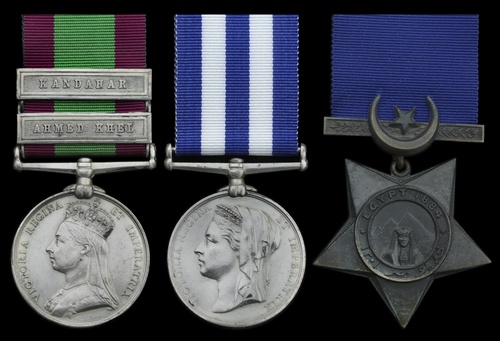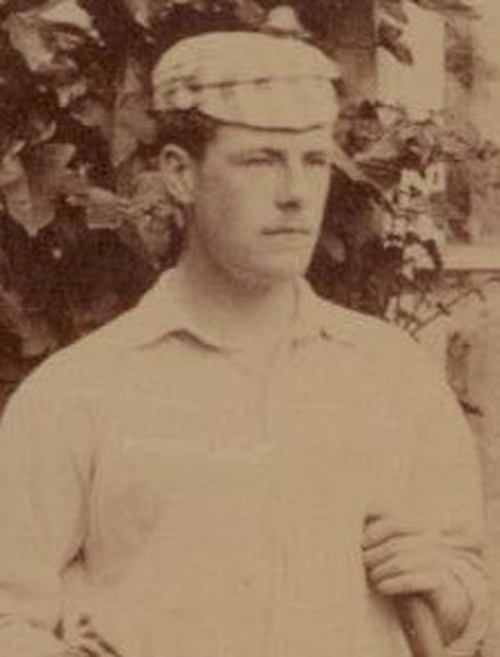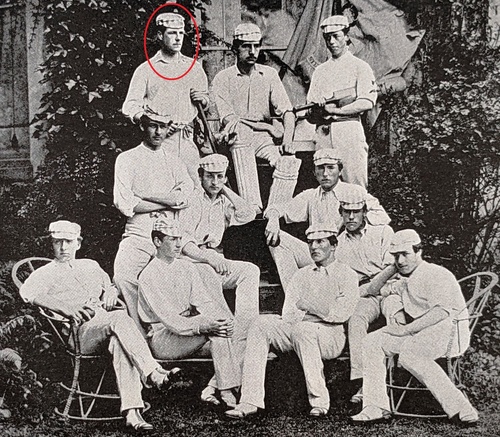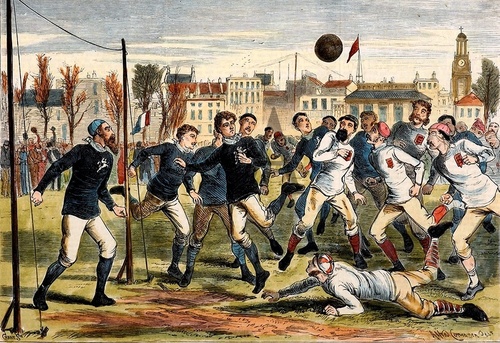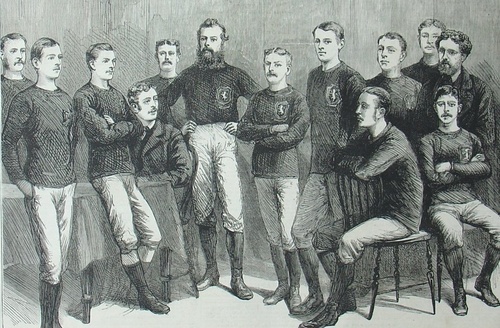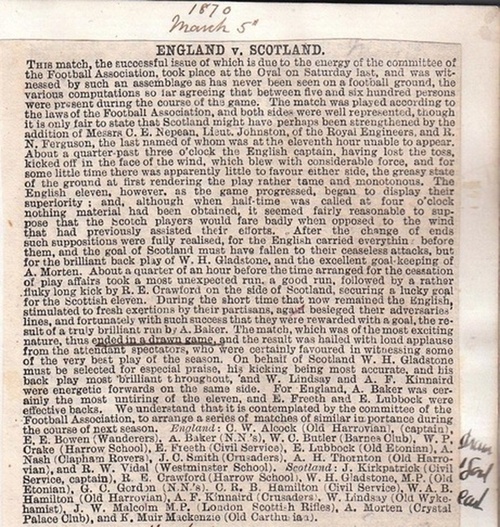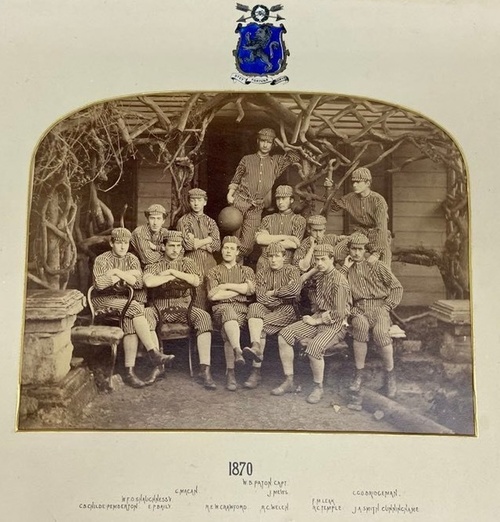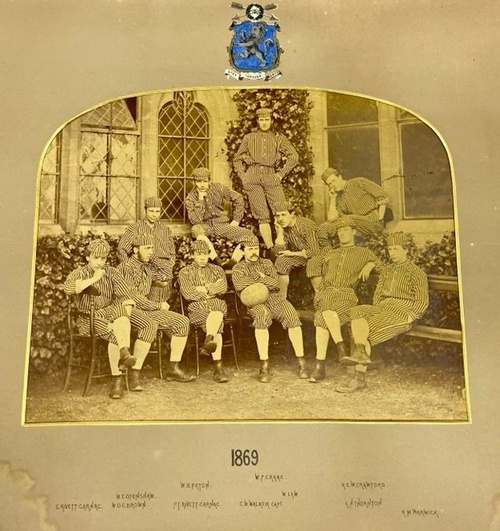Auction: 22003 - Orders, Decorations and Medals
Lot: 198
(x) The campaign group of three awarded to Lieutenant R. E. W. Copland-Crawford, King's Royal Rifle Corps, a skilled sportsman who scored the first goal in the history of International Football, when hitting the back of the net playing for Scotland in the 75th minute of their match against England at The Oval in 1870 - at that time he was still a Harrow schoolboy and also went on to play First Class Cricket
Copland-Crawford saw active military service in Afghanistan and Egypt - during which time he was 'mentioned' for gallantry at Ahmed Khel- but his career ended in disgrace whilst serving the Sierra Leone Frontier Police, when he was eventually tried and imprisoned having been found guilty of causing a native servant to be flogged to death; it should be further noted that he perpetrated ghastly retributions against the local populations in his period of service in Africa
Afghanistan 1878-80, 2 clasps, Ahmed Khel, Kandahar (Lieut: R. E. W. Copland. Crawford. 2/60th. Foot); Egypt and Sudan 1882-89, undated reverse, no clasp (Lieut: R. E. W. Copland-Crawford. 3/K. R. Rif: C.); Khedive's Star 1884, good very fine (3)
Robert Erskine Wade Copland-Crawford was born on 5 September 1852 at in Elizabeth Castle, Jersey where his father, Captain Crawford was serving in the Royal Artillery. Raised in Edinburgh, he went up to Harrow School in 1866 and soon excelled on the sports field.
First love - Cricket
He made the Cricket XI in 1868 and his finest hours came against the Lords and Commons XI on 10 June 1871. On that day he scored 72 and took four wickets with his underarm bowling in a drawn match. Latterly in life he turned out for the M.C.C. (two of these First Class matches) as well as playing for the Old Harrovians, the Army and I Zingari, for whom he stroked 106 playing with a young George Harris, who scored 117, against the Household Brigade. Harris would go onto captain Kent and England.
True love - Football
It was perhaps on the football field that Copland-Crawford really made the headlines and wrote his name into history. It all happened whilst he was still a schoolboy, when in C. W. Alcock and Arthur Kinnaird on 5 March 1870 laid on what was to be the first International Soccer Match in history. Played at The Oval, the match pitted the finest players who were available in the first of five such matches, which took place over a span of two years and began the long tradition of the scene of international matches that we know today.
The Scottish XI included Sir James Kirkpatrick, 8th Bt., William Gladstone MP, the son of the Prime Minister, John Malcolm, later 1st Baron Malcolm, the Baillie-Hamilton brothers, Kenneth Muir Mackenzie, later 1st Baron Muir Mackenzie, William Lydnsay and Kinnaird himself.
Their opponents were no less distinguished and also included Edward Ernest Bowen, schoolmaster at Harrow and the author of the school song; Edgar Lubbock, who would twice win the FA Cup; and Walpole Vidal, the famous 19th century footballer.
The match was organised by the Football Association and resulted in a 1–1 draw, its playing being delayed by two weeks due to a strong frost which rendered the surface 'dangerously unfit'. After a good first half, the match was 0–0 when the teams changed end at half-time – a rule that The Sporting Gazette described as a new invention – but Scotland took the lead with just fifteen minutes left to play. It was to be Copland-Crawford who wrote his name into the history books in scoring that first ever international goal.
It occured after England had moved their goalkeeper upfield in order to attempt to force the game. He took his chance and with '...a rather lucky kick...almost a fluke' the deadlock was broken. England equalised in the 90th minute with a goal from Alfred Baker and the match ended in a 1–1 draw.
Copland-Crawford played in the second meeting of the two nations but missed the third fixture. By the time of the fourth match on 18 November 1871 he was joined by his brother in the Scotland XI and was '...truly unwearied from beginning to end...owing to the long journey from Edinburgh...[he] hardly showed his best form'. They both again played in the final match which proved another victory for England. Copland-Crawford had played with skill in four of the first five international matches. He, together with his brother, joined the Harrow Chequers Football Club and started the 1871-72 season as Captain. His final match for them was the FA Cup semi-final against Queen's Park on 4 March 1872, which ended in a 0–0 draw.
Rifleman
As a soldier, he joined the 2nd Middlesex Militia in September 1873 and was made Sub-Lieutenant in the 60th Rifles in January 1874. Promoted Lieutenant, he served with distinction in Afghanistan, when he was 'mentioned' for his bravery at Ahmed Khel (London Gazette 30 July 1880, refers) and was also on the march from Kabul to Kandahar (Medal & 2 clasps, Bronze Star). Having seen further active service in Egypt and Sudan, Copland-Crawford resigned his commission in August 1884.
Journey's end - disgrace
The final chapter of this story is one of tragedy and ignomony, after he accepted a six-month contract with the Sierra Leone Frontier Police in September 1888. Posted to Sulymah district, he was tasked with opening negotiations with Chief Makaia, under the orders of the Governor, Sir James Hay. He was met favourably by the natives, who were happy to host their visitor and discuss matters. Copland-Crawford, however, had his own views:
'As your Excellency is well aware, the only way to renew trade, not 5 per cent, but 100 per cent, which means good for the Revenue as well as good for the merchants and traders, is to smash once and for all Mackiah, on one side, and Gumbo Saida.'
Hay quickly replied:
'While I am pleased to note that your journey has not been attended by any untoward accident, I cannot but remark that it is one which should not have been undertaken without specific instructions from the officer administering the Government, the more so as, at present, the relations between Mackiah and this Government are such that the future policy in dealing with him is one which requires much consideration.'
This act behind him, Copland-Crawford went onto attempt to engage Chief Fahwoondoo in further matters. The offer of a meeting was denied, he attempted to have him arrested and a contact followed, in which 10 of the Chief's men were killed at the loss of three Constables. Hay again:
'Apart from the fact that your action may create complications, it is at all times, and more so at present, unadvisable to arouse the hostility of the people with whom the police come in constant contact, as it may have a tendency to render their services as messengers, as heretofore, of little or no use to us when once distrust has been created. I remark, that you say in your Report that you issued a warrant to make this arrest; this, I need hardly inform you, was invalid, and should not again be resorted to.'
Copland-Crawford was clearly not for turning and on 12 December, he set out to attack and kill as many of the 'Warboys' of the former Chief at Jehoma. No less than 137 were slaughtered on his orders, in which he in fact '...had no authority from this Government to assume the offensive by attacking towns.'
Word of these actions eventually made their way back to London and the matter was raised in a heated debate in Parliament in June 1890. As it was, in April 1889, he had been arrested on a charge of causing a native servant to be flogged to death, his object being to extort a confession of crime. In July, he was tried at Freetown and found guilty. Copland-Crawford was duly sentenced to 12 months imprisonment with hard labour. His health was failing and thus he was to be shipped back to England to serve his time. On arrival his conditions were as follows:
'Absence of reflex action at left knee, slightly present in right knee; impaired sensibility of left foot and leg up to knee; inability to clench the hands tightly; unsteadiness of gait; œdema of both ankles and feet; enlargement of abdomen (evidently from fluid) with increased size of liver and spleen; excited action of heart; marked mental excitement; slight hesitancy in speech.'
Due to his poor health, the remainder of his sentence was remitted. Copland-Crawford died on 23 May 1894, aged just 42. His boyhood exploits on the football field will certainly go down in history, whilst his actions in West Africa should also be recalled.
Sold together with an original scorecard from the 1871 Eton Vs Harrow match and a copy of M.C.C. Cricket Scores and Biographies, 1871-1873.
Subject to 5% tax on Hammer Price in addition to 20% VAT on Buyer’s Premium.
Sold for
£2,200
Starting price
£1800

